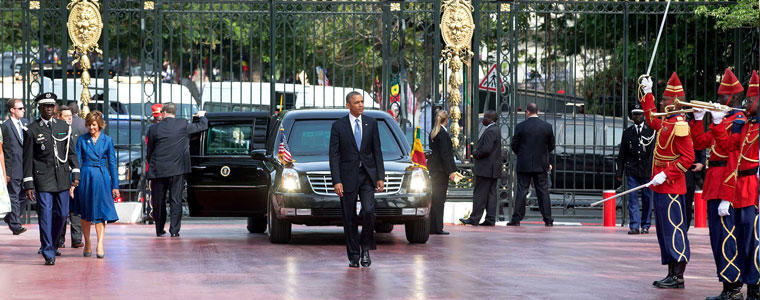President Barack Obama’s first extended trip to Africa will seize on democratic and economic progress in the three countries on his itinerary – Senegal, South Africa and Tanzania – to inspire further advances across the continent and encourage more American companies to plunge in.

“Growth rates in Africa are accelerating, and have continued to accelerate despite the financial doldrums that the global community has seen since 2008,” said former Assistant Secretary of State for African Affairs Johnnie Carson, who left the State Department in March after almost four years in office and has joined the U.S. Institute of Peace as special adviser to Institute President Jim Marshall. Carson commented on the president’s coming trip for reporters in a briefing at USIP on June 24.
Obama’s visit, scheduled from June 26 to July 3, is his second to Africa as president. He visited Ghana for 36 hours in July 2009 for a major policy speech on the need to further strengthen democratic institutions and good governance on the continent. In addition to continued democratic and economic advances, the president this time also will highlight the role young people can play in a part of the world where more than half the population is younger than 35.
“The President will reinforce the importance that the United States places on our deep and growing ties with countries in sub-Saharan Africa,” the White House said in a May 20 statement announcing the trip. He’ll address “expanding economic growth, investment, and trade; strengthening democratic institutions; and investing in the next generation of African leaders.”
South Africa is scheduled as the second country in Obama’s itinerary after Senegal, a plan that likely will have to remain flexible as the world watches with concern the health of peace icon Nelson Mandela.
The 94-year-old Nobel Peace Prize recipient has spent most of this month in a Pretoria hospital and his condition was downgraded to critical on June 23. Mandela became South Africa’s first black president in 1994 after the end of apartheid and his 27-year confinement as a political prisoner on Robben Island when the country was under minority white rule.
“His importance in helping to bring about a peaceful political transformation in one of Africa’s most important countries will remain an enormous historical marker for decades and decades to come,” said Carson, who met Mandela six months after his release from Robben Island.
While some countries of Africa such as Sudan and the Democratic Republic of Congo continue to experience conflict, “the real story out of Africa is the growth of its democratic institutions, the success of its elections and the commitment, increasingly, of governments to act in responsible, democratic ways,” Carson said.
The countries still in the midst of violent conflict, which also include Mali and Somalia, represent a minority of the 49 states of sub-Saharan Africa. And even Somalia is making strides, with the militant group al-Shabaab dispersed and significantly weakened and al-Qaida in East Africa having been “largely decimated.”
“We’ve seen a succession of really groundbreaking and fundamentally altering democratic elections,” Carson said. “We’ve seen elections in which countries that have had virtually no democracy for decades become democratic. We’ve seen entrenched parties and political leaders be defeated and step aside quietly.”
As examples, Carson cited the case of former Senegalese President Abdoulaye Wade, who stepped down after 12 years in power when he was defeated last year in a runoff election by Macky Sall. Guinea held its first democratic election in 2010, ending a succession of ruthless military leaders that had extended for more than 50 years. Nigeria held successful democratic elections in 2011 despite complex political issues. In Zambia, President Rupiah Banda was replaced “without any political disturbances whatsoever,” Carson said.
All three countries Obama is visiting also have “enormous upside potential” economically, he said.
South Africa hosts about 600 American companies, more than any other country in sub-Saharan Africa, Carson said. Senegal and Tanzania each have received more than $500 million in grants from the Millennium Challenge Corp. program that aims to reinforce good governance and economic growth in poor countries. Both are using the funding to develop infrastructure and agriculture, and Tanzania also is investing in power generation, Carson said.
China is a growing investment player in Africa, as are Turkey, India and Brazil. But the U.S. economic interest in Africa is driven more by its own longstanding and deep national interests, political ties and historical connections, Carson said.
American companies are still some of the world’s leaders in the oil and gas industry despite China’s rise. The U.S. fills about 17 percent of its demand for petroleum from Africa, Carson said, and Nigeria is the fifth-largest exporter of petroleum to the U.S., just below Saudi Arabia.
Still, Carson emphasized the need for a level playing field among investors, alluding to allegations that China extracts the minerals and other benefits to be had on the continent with little respect for the welfare of local populations. China should be required to adhere to the same labor laws and environmental standards and provide technology transfer and appropriate employment of local workers rather than just importing its own, he said.
“African countries must insist that China play by the very same rules that American, British, Japanese, German, French, Dutch, Swedish and Spanish companies play by,” he said.
Agriculture will play a particular role in determining how fast Africa’s economies grow, having been bypassed by the agricultural “Green Revolution” that multiplied crop yields in Latin America and Asia with technology for higher yields that turned food-importing countries into more prosperous exporters. Obama will focus on that topic particularly in Senegal and Tanzania, Carson said.
Tanzania also holds “particularly good opportunities” in the energy sector, because of the “enormous abundance” of electrification potential that’s underutilized in areas such as solar, geothermal and hydro-electric power, as well as in coal, Carson said.
“We should be engaged in Africa’s economic growth because it is in our own national interest,” he said.